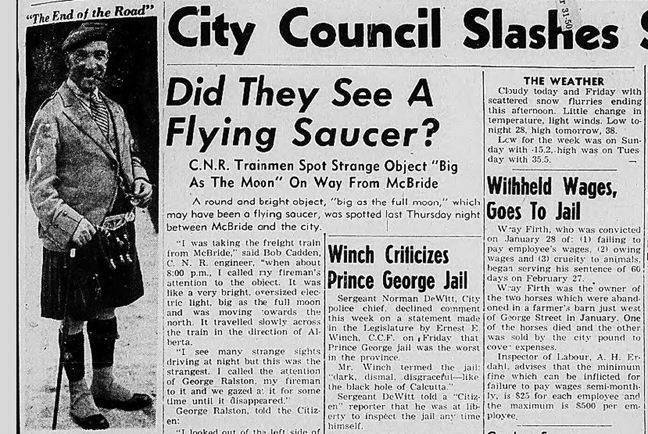This week in Prince George history, May 22-28:
May 23, 1940: The local branch of the Army and Navy Veterans in Canada sent a telegram to Prime Minister William Lyon Mackenzie King, calling for all 'enemy aliens' to be interned, The Citizen reported.
"Army & Navy Veterans Association, Post 258, Prince George, B.C. by resolution unanimously passed at a general meeting held May 18, 1940, demand that the Government of Canada immediately intern all enemy aliens present in Canada and furthermore that steps be at once taken to deport all aliens of other nationalities who by speech or action express sympathy with the aims and actions of the enemy," the telegram, signed by association president Everett MacEachern, said.
"This action has already been taken by many returned soldiers' organizations across Canada and is indicative of the growing feeling of all loyal Canadians and British subjects the world over," The Citizen wrote. "There is ample proof of the necessity for such counter measures, and it is hoped that other organizations will co-operate with the returned soldiers in their efforts and leadership."
(ITALIC) This is a case where both the veterans' organization and The Citizen were on the wrong side of history.
On Feb. 24, 1942 King issued several orders-in-council calling for the internment of all people of Japanese origin to be relocated to "protective areas."
Nearly 21,000 people - of which more than 13,000 were Canadian citizens by birth - were relocated and had their personal property seized and sold by the government.
Adding to the sting of the injustice was the fact that no similar measures were taken against Canada's large German- and Italian-Canadian populations. (END ITALIC)
May 27, 1916: A special train carrying 100 firefighters left for Willow River at noon to help battle a "fiercely burning forest fire driven by a high wind," that threatened to destroy the town and large sawmill located nearby.
At 9:30 a.m. on May 27, 1916 a messenger arrived on foot from Willow River, approximately 36 kilometres away, carrying word that the town was in danger.
"A ring of fire practically surrounds the town and every available man is out fighting to save the town," The Citizen reported. "In half an hour, district forester Marvin had marshalled his forces, and every available man was recruited for the work. Shovels, axes and firefighting equipment was quickly mustered together with food supplies for the large force."
The Grand Truck Pacific put a train at the disposal of the crew, which left for Willow River "in record time."
"Some idea of the devastating intensity of the fire can be gathered from the fact that in two places the fire had jumped the Fraser River and commenced its work of destruction on the opposite side," The Citizen report concluded.
Other forest fires were burning on "the hill west of town," near Mud River and a small one north of the Nechako River had been recently extinguished.
(ITALIC) If there was a follow-up article on the Willow River fire, the issue has been lost and isn't in The Citizen's archives. I wasn't able to find any other sources which had details of the blaze.
But an editorial in same issue of The Citizen called for residents to be careful with fire, especially when the weather has been dry.
"We wonder when people will realize that dead grass and undergrowth, after a few days' hot weather, are much easier to light than to extinguish; and that it is also much easier to tread out a match or camp fire when done with, than after they have spread over half a square mile of timber -more economical too."
It's been 100 years, and clearly some people still don't get it. (END ITALIC)
To explore 100 years of local history yourself, visit the Prince George Citizen archives online at: pgc.cc/PGCarchive. The Prince George Citizen online archives are maintained by the Prince George Public Library.



